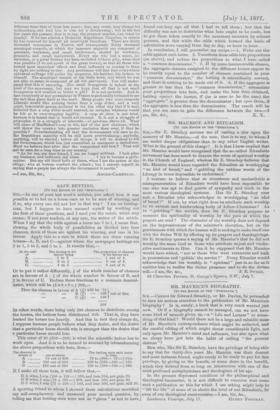SAFE BETTING.
[TO TER EDITOR OF THE "SPROTATOR.1
SIR,—In one of your last week's articles, you asked how it was possible so to bet on a horse-race as to be sure of winning, and if so, why every One did not bet in that way ? I am no betting- man, but I happen to have amused myself by working out the first of these questions, and I send you the result, which may amuse, if not your readers, at any rate, the writer of the article. When I say that the odds against a horse are 3 to I, I mean that,
viewing the whole body of possibilities as divided into four chances, three of those are against his winning, and one in his favour. Apply this to a race in which there are three running
horses—A, B, and C—against whom the newspaper bettings are 3 to 1,,5 to 3, and 5 to 4. It results that,— In the caSe The betting in his The proportion of chances of favour being in bis favour are A. 1 to 8 1 out of 4.
B. 3 to 5 3 out of 8.
C. ..... 1 to 5 4 gut of 9.
Or to put it rather differently, f of the whole number of chances
are in favour of A ; t of the whole number in favour of B, and t. in favour of C. Reduce these fractions to a common denorni-
nator, which will be (4 x 8 x9 =-.) 288,— Then the chances in favour of A (1) will be 72
B — 108 out of 288.
— (#) — 128
308
In other words, there being only 288 chances to distribute among the horses, the bettors have distributed 308. That is, they have backed the horses too heavily. And this in fact they always do, I suppose because people believe what they desire, and the desire that a particular horse should win is stronger than the desire that a particular horse should lose.
This error of 20 (308-288) is what the scientific bettor has to work upon. And it is to be turned to account by retransforming the above proportions with bets, thus,—
The chances in The betting upon each horse favour of are as above is then A 72 out of 288 72 to (288— 72=z) 210, 108 out of 288 108 to (288-108 180.
128 out of 288 128 to (288-128=) 160.
If I make all these bets, it will follow that,—
If A wins, I win (108 + 128=) 236, and lase 216, net gain 20, If B wins, I win (72 ± 12$ 200, and lose 180, not gain 20. If 0 wins, I win (71 108 =) 180, and lose 160, not gain still 20.
A sporting friend to whom I showed then calculations mortified my self-complacency, and answered your second question, by telling me that betting-men were not so " green " as not to have found out long ago all that I had to tell them ; but that the difficulty was not to determine what bets ought to be made, but to get them taken exactly to the necessary amounts by solvent persons, and this while the odds which formed the basis of calculation were varying from day to day, or hour to hour.
In conclusion, I will generalise my recipe :-1. Write out the odds against each horse. 2. Transform these odds into proportions (as above), and reduce the proportions to what I have called a "common denominator." 3. If by some inconceivable chance, the aggregate chances assigned to the different horses appear to be exactly equal to the number of chances contained in your- " common denominator," the betting is scientifically correct, and there is nothing to be made out of it. 4. If the aggregate is greater or less than the "common denominator," retranslate your proportions into bets, and make the bets thus obtained, betting against the horses, if (as is sure to be the case) the " aggregate " is greater than the denominator ; but upon them, if the aggregate is less than the denominator. The result will be that you are sure to gain the difference between the two.--I


































 Previous page
Previous page